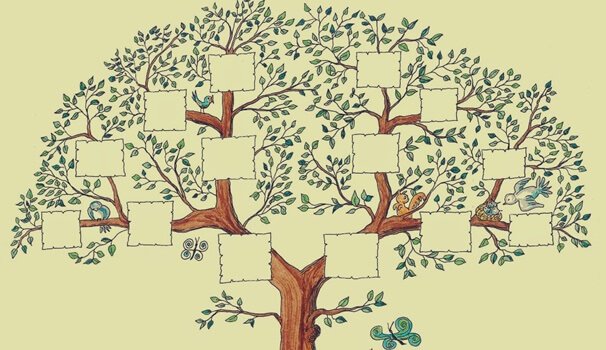What Can You Learn From Your Family Tree?

The family tree was first used to keep information about the origin of one’s family. Before, it was only used to prove the purity of a family’s ancestry or the grandeur of their past.
Nowadays, things have changed. The family tree has become a tool of self-discovery. Unfortunately, not many families keep information on their past and share it with the following generations. Thus, sometimes it’s not easy to get information about one’s family roots.
“Nobody exists alone, nobody lives alone. We are all what we are because others were who they were.”
-Julio Medem-
Family trees can be a treasure trove of data to understand who we are and why we’re the way we are. The information it provides is holistic. That is, it allows us to see links between the past, present, and future. We all come from a history built over centuries. We’re each also a step towards the future. A family tree can help us clarify all of this.
The family tree and one’s family
Family is not just another factor in a person’s life. It’s the essence of who you are, regardless of the type of bond you may have with yours. It was there before you were born, and it will remain after you have left. We all carry its unique seal, even in the case of abandonment or disappearance. In fact, that absence can be one of the greatest defining characteristics of your life.

A family tree helps us build emotional memory. Emotional memory is a cluster of past experiences influencing our behavior. A big part of this memory is not expressed in conscious terms. Sometimes, it’s only composed of impressions, opinions, attitudes… imprints that are manifested but whose origins are unknown.
Families pass on, consciously or unconsciously, their guilt, fears, taboos, and brightness. Your family history is like a novel, of which you are a chapter. But, how can I understand this chapter or give it meaning if I haven’t read the rest?
Important information in the family tree
A family tree sometimes reveals unexpected information. Other times, it’s not nearly as spectacular, but that doesn’t make it any less important. It’s not so much about making the family tree, it’s about interpreting it. To do so, pay special attention to certain bits of information. The following is information of special importance:
- The length of time between siblings. There are no formulas for this. But the space between siblings is a determining factor of one’s psychological structure. Basically, it determines the relationship you’ll have with money, possessions, and territory (physical and emotional).
- Double lineage. Our parents are the confluence of two great family traditions. But one is always more prevalent than the other. Why? It is truly important information. Any lack of information about our grandparents is, too. These empty spaces tend to hide important elements. You also want to know if anyone else in the family has your name. If so, you’re part of an unresolved narcissistic conflict.
- Repeated elements. This includes ages at which people got married or had their first children, jobs, or any other fact that appears more than once. Usually, these repetitions indicate an unconscious script. By ending these repetitions, you’ll move forward.
- The causes of death in your family. It’s important to find out how your ancestors died. If there were accidents or suicides, this information should be researched in detail. Deaths due to cardiac, respiratory, or immunological problems allude to strong emotional components.

In a novel, some facts are narrated, but many others lie only between the lines. Some words are said and others are left unsaid. The same goes for families. A family tree is an opportunity to rewrite history. Discover and describe the traces of your ancestry. Learn more about yourself.
The family tree was first used to keep information about the origin of one’s family. Before, it was only used to prove the purity of a family’s ancestry or the grandeur of their past.
Nowadays, things have changed. The family tree has become a tool of self-discovery. Unfortunately, not many families keep information on their past and share it with the following generations. Thus, sometimes it’s not easy to get information about one’s family roots.
“Nobody exists alone, nobody lives alone. We are all what we are because others were who they were.”
-Julio Medem-
Family trees can be a treasure trove of data to understand who we are and why we’re the way we are. The information it provides is holistic. That is, it allows us to see links between the past, present, and future. We all come from a history built over centuries. We’re each also a step towards the future. A family tree can help us clarify all of this.
The family tree and one’s family
Family is not just another factor in a person’s life. It’s the essence of who you are, regardless of the type of bond you may have with yours. It was there before you were born, and it will remain after you have left. We all carry its unique seal, even in the case of abandonment or disappearance. In fact, that absence can be one of the greatest defining characteristics of your life.

A family tree helps us build emotional memory. Emotional memory is a cluster of past experiences influencing our behavior. A big part of this memory is not expressed in conscious terms. Sometimes, it’s only composed of impressions, opinions, attitudes… imprints that are manifested but whose origins are unknown.
Families pass on, consciously or unconsciously, their guilt, fears, taboos, and brightness. Your family history is like a novel, of which you are a chapter. But, how can I understand this chapter or give it meaning if I haven’t read the rest?
Important information in the family tree
A family tree sometimes reveals unexpected information. Other times, it’s not nearly as spectacular, but that doesn’t make it any less important. It’s not so much about making the family tree, it’s about interpreting it. To do so, pay special attention to certain bits of information. The following is information of special importance:
- The length of time between siblings. There are no formulas for this. But the space between siblings is a determining factor of one’s psychological structure. Basically, it determines the relationship you’ll have with money, possessions, and territory (physical and emotional).
- Double lineage. Our parents are the confluence of two great family traditions. But one is always more prevalent than the other. Why? It is truly important information. Any lack of information about our grandparents is, too. These empty spaces tend to hide important elements. You also want to know if anyone else in the family has your name. If so, you’re part of an unresolved narcissistic conflict.
- Repeated elements. This includes ages at which people got married or had their first children, jobs, or any other fact that appears more than once. Usually, these repetitions indicate an unconscious script. By ending these repetitions, you’ll move forward.
- The causes of death in your family. It’s important to find out how your ancestors died. If there were accidents or suicides, this information should be researched in detail. Deaths due to cardiac, respiratory, or immunological problems allude to strong emotional components.

In a novel, some facts are narrated, but many others lie only between the lines. Some words are said and others are left unsaid. The same goes for families. A family tree is an opportunity to rewrite history. Discover and describe the traces of your ancestry. Learn more about yourself.
This text is provided for informational purposes only and does not replace consultation with a professional. If in doubt, consult your specialist.







